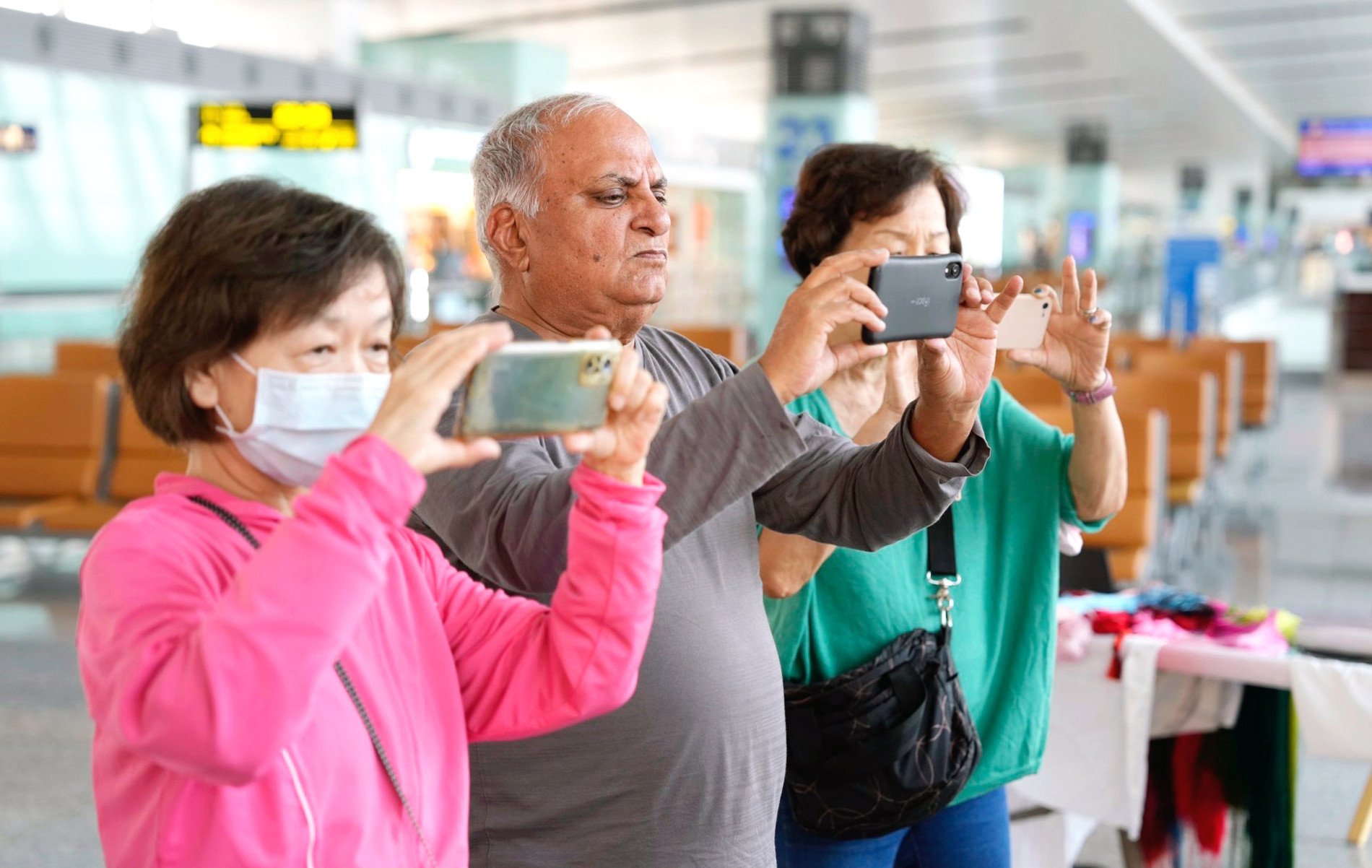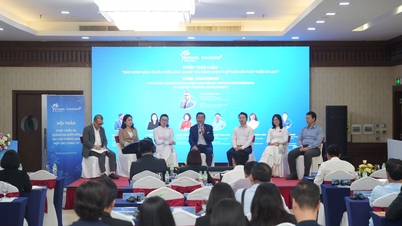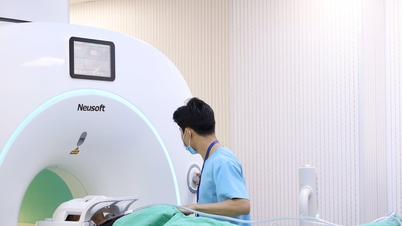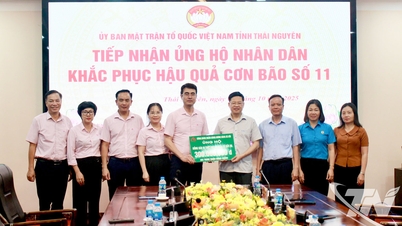Double effect after travel voucher campaign
The tourism voucher issuance campaign has become a highlight in Da Nang 's stimulus program for the 2024-2025 period. At the workshop on Developing and promoting tourism destinations through public-private partnership, held on October 9, Ms. Nguyen Thi Hong Tham, Director of the Promotion Center (Department of Culture, Sports and Tourism of Da Nang), said that in the context of fierce competition between destinations, cooperation with online travel platforms (OTA) is considered a strategic move of the city.
In order to promote domestic and international tourism demand to Da Nang through voucher incentives, especially during the low season and stimulate spending at the destination, in 2024, Da Nang launched 1,800 vouchers worth 900 million VND and this number increased to 6,000 vouchers, with a total value of more than 1.3 billion VND in 2025.
Thanks to that, in the first 9 months of this year, the city attracted 5.8 million international visitors, an increase of 27% over the same period last year.
According to Ms. Tham, 80% of tourists in Da Nang book services through OTA platforms, showing a clear trend of digitalization. By cooperating with the Traveloka platform, the city has mobilized the participation of all parties, from travel agencies, accommodation establishments to entertainment services... Not only has the number of bookings increased sharply, but taking advantage of the large user ecosystem of OTAs has also helped Da Nang promote its destinations and support businesses in digital transformation.

Building on the success of Da Nang, Ho Chi Minh City is also implementing an e-voucher program with a total value of 4.5 billion VND in 2025. This locality has just signed a cooperation agreement with Traveloka, thereby increasing the number of vouchers to 28,300, with a total value of more than 10 billion VND.
A representative of the Ho Chi Minh City Department of Tourism said that after only one week of calling, 100 units responded. The program has only been implemented for one month (from September 9) so there is not much evaluation data yet, but Ho Chi Minh City hopes to bring benefits to businesses and tourists, contributing to achieving the target of 10 million international visitors and 50 million domestic visitors this year.
According to Ms. Vo Ngoc Diep, Head of the Department of Tourism Accommodation Management, Ho Chi Minh City Department of Tourism, applying digital platforms not only stimulates demand but also brings new positive factors in promoting and promoting tourism. Along with e-commerce channels, Ho Chi Minh City is implementing the construction of digital information data, thereby creating personal experiences for customers.
“The deployment of a data center, the construction of a digital map and the connection with OTA platforms such as Booking, Traveloka, Agoda... will help tourists easily search and book services. In parallel, digital communication campaigns will be launched to position the tourism brand for Ho Chi Minh City,” said Ms. Diep.
Meanwhile, in Hanoi, cooperation with OTA platforms aims to promote digital tourism, take advantage of user behavior data to promote the capital's typical products and enhance Hanoi's position on the world tourism map.
Director of Traveloka Vietnam, Ms. Huynh Thi Mai Thy, said that this is a clear demonstration of the effectiveness of the public-private partnership model in tourism. When local authorities expand cooperation with OTA platforms, promotional campaigns can be deployed flexibly, measured with real data and reach the right customers.
In the region, Mr. Nguyen Quy Phuong, Head of the Department of International Relations and Tourism Promotion (Vietnam National Administration of Tourism) cited that Thailand - the largest tourist attraction in the region and top in the world, which previously mainly welcomed guests through travel agencies, has now also sharply increased the number of guests booking on online travel platforms.
Creating new momentum for Vietnamese tourism
“Sharing hands” with online travel platforms to develop and promote destinations is part of public-private cooperation in the tourism industry. This coordination has helped expand the market, increase the number of visitors, and strongly spread the image of Vietnam to the world.

Ms. Nguyen Thi Hoa Mai - Deputy Director of the Vietnam National Administration of Tourism, emphasized that attracting tourists is one of the key tasks of Vietnam. In addition to the role of state management agencies, the cooperation of travel agencies, hotels, and travel agencies is very important. A series of programs, events, fairs, and annual tourism promotions clearly demonstrate the role of public-private cooperation. This is also an inevitable trend in the world.
In its role as a state manager, in the coming time, the Vietnam National Administration of Tourism will strongly promote public-private cooperation, thereby both mobilizing maximum social resources in tourism development and demonstrating its role in connecting and creating a playground to ensure the interests of the State, businesses and tourists.
In particular, the Department will promote the exploitation of the role of OTA platforms as strategic channels in promotion, market analysis and tourist behavior research, helping to more accurately orient communication campaigns according to each market and new tourism trends.
The agency also provides specific directions for cooperation in promotion, digital transformation and development of specific tourism products, while encouraging localities to socialize resources, cooperate with airlines, technology platforms and travel businesses to deploy large-scale promotional campaigns at home and abroad.
To improve the effectiveness of public-private cooperation, Ms. Nguyen Thi Hoa Mai said that it is important to focus on solving many problems arising in practice.
That is, the mechanism for sharing risks and benefits between parties is still not really harmonious, making private enterprises hesitant to participate in long-term projects; social resources have not been mobilized comprehensively; many cooperation projects do not have effective measurement tools and clear KPIs to evaluate results.
In addition, most small and medium-sized enterprises still face difficulties in capital, management capacity and access to information, which limits their participation in the public-private partnership chain.
Source: https://vietnamnet.vn/tu-chien-dich-voucher-den-hop-tac-cong-tu-du-lich-viet-nam-lam-moi-minh-2451024.html


![[Photo] Unique Phu Gia horse hat weaving craft](https://vphoto.vietnam.vn/thumb/1200x675/vietnam/resource/IMAGE/2025/10/10/1760084018320_ndo_br_01-jpg.webp)
![[Photo] Ho Chi Minh City is brilliant with flags and flowers on the eve of the 1st Party Congress, term 2025-2030](https://vphoto.vietnam.vn/thumb/1200x675/vietnam/resource/IMAGE/2025/10/10/1760102923219_ndo_br_thiet-ke-chua-co-ten-43-png.webp)
![[Photo] Opening of the World Cultural Festival in Hanoi](https://vphoto.vietnam.vn/thumb/1200x675/vietnam/resource/IMAGE/2025/10/10/1760113426728_ndo_br_lehoi-khaimac-jpg.webp)





































































































Comment (0)